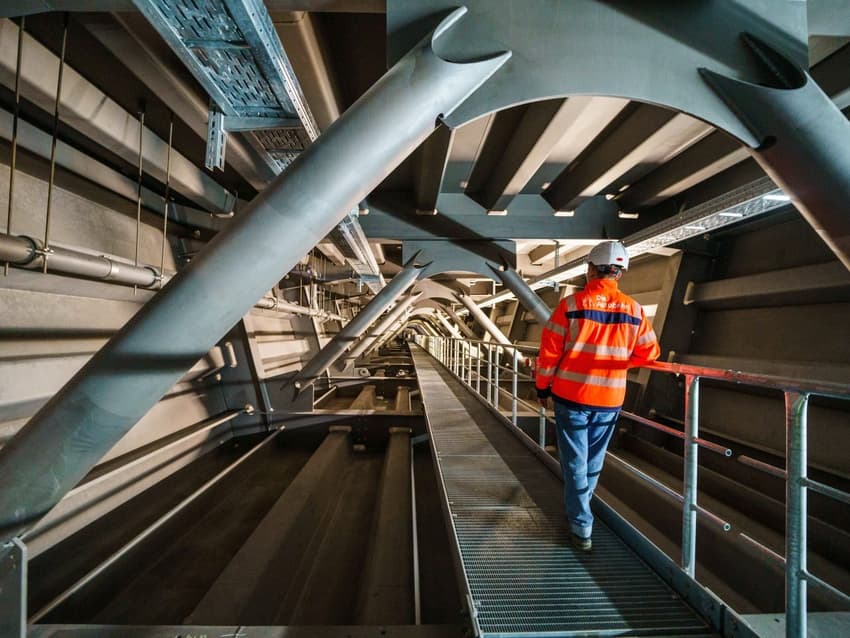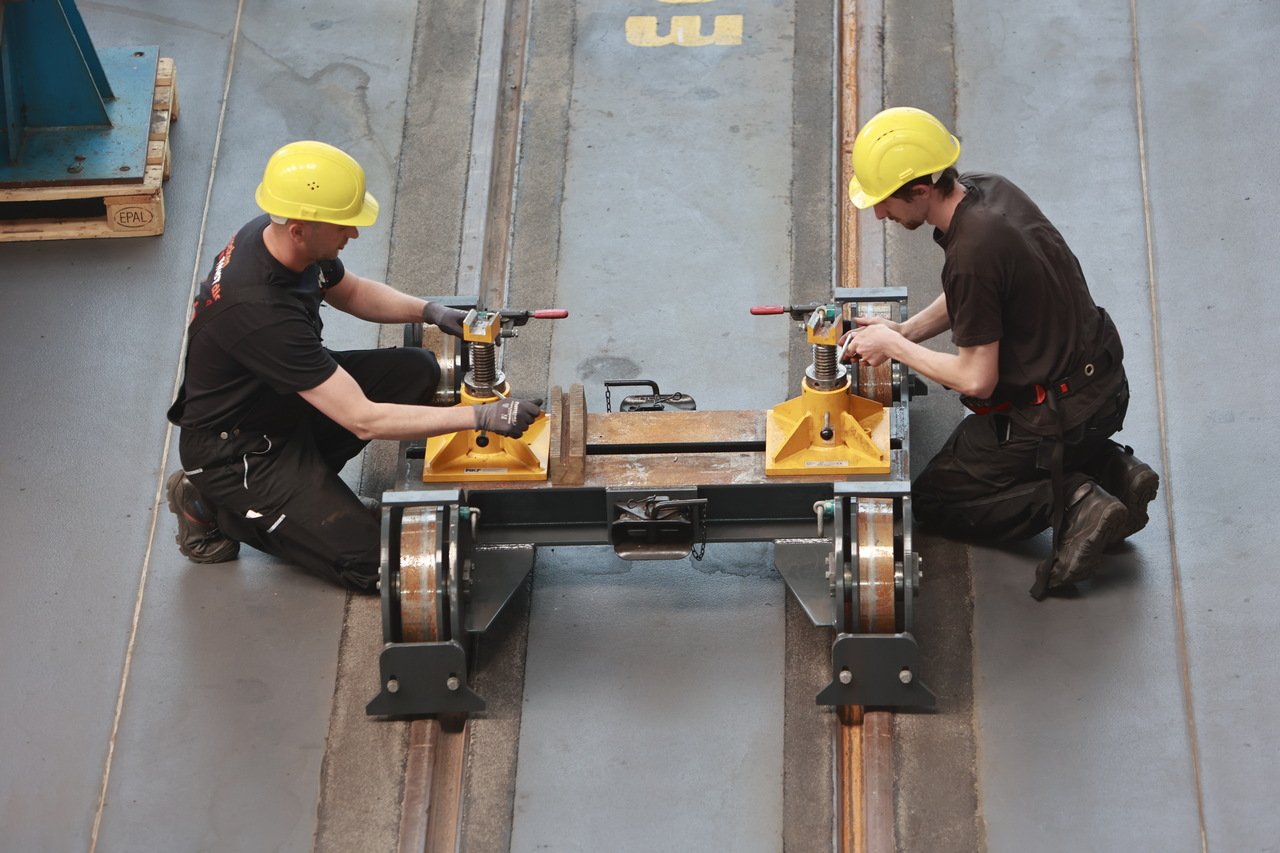Why German companies want faster permits and more housing for foreign workers

A new report has revealed that half of all German companies have vacant positions they are unable to fill. Employers say the government should speed up visa processes and make it easier for them to hire non-EU foreigners.
How bad is the skilled worker shortage in Germany at the moment?
Companies in Germany have been complaining of worker shortages for some time, but a new report by the German Chamber of Industry and Commerce (DIHK) has shed light on the scale of the problem in 2023.
According to the Skilled Worker Report released on Wednesday, half of all companies in Germany currently have unfilled vacancies and are struggling to find qualified staff to fill them.
This was down from 58 percent the year before.
Just 14 percent said they had "no problems" finding staff, while the remaining 36 percent said they were currently adequately staffed.
Somewhat surprisingly, the downturn in Germany's economic outlook seems to have had little impact on the difficulties in finding workers.
Even if companies were hiring fewer people than before, they still reported the same amount of open positions as they did the previous year.
While some sectors were harder hit than others, businesses in almost all sections of the economy reported that they were looking for staff, with skills gaps affecting almost every profession.
"The skilled labour situation remains very critical," said DIHK Deputy Managing Director Achim Dercks. "This applies not only to the companies directly affected, but also to our business location as a whole."
Information from more than 22,000 companies was analysed for the report, which currently estimates that 1.8 million jobs remain unfilled.
According to the report, this means that more than €90 billion in added value will be lost to Germany's economy this year.
READ ALSO: How Germany is making it easier for skilled workers to get an EU Blue Card
Which companies have the worst shortages?
Construction and manufacturing were the hardest hit by the skilled worker shortage, with around 60 percent companies in these sectors reporting unfilled positions.
This was followed by the services industry, where 52 percent of companies were in need of new workers, and trade, where 43 percent reported vacancies.
Large companies with more than 1,000 employers were having the greatest difficulties when it came to filling open positions in their firms. Almost three quarters - or 73 percent - of businesses of this size currently have vacancies to fill.

A job applicant prepares their CV on a laptop. Photo: picture alliance/dpa/dpa-tmn | Christin Klose
Meanwhile, 69 percent of companies with between 200 and 1,000 employees were tackling a shortage of skilled workers, compared to 60 percent of companies with 20 to 199 employees.
At the smallest end of the spectrum, around a third (33 percent) of companies with fewer than 10 workers were currently looking for new workers.
READ ALSO: EXPLAINED: Which German sectors have the most job openings?
What type of workers are most in-demand?
According to the DIHK report, the most common shortage on the labour market is for people with dual apprenticeship and vocational training: 55 percent of companies that are searching for employees would like to hire this type of worker.
In addition, 40 percent of companies were looking for people with further vocational training, with 34 percent trying to find university graduates with little success.
The report's authors also noted that the concept of the "skilled worker" shortage may increasingly be a misnomer.
"Difficulties in filling positions with people who have not completed training (35 percent) make it clear that companies are not only lacking trained specialists, but increasingly also workers with low qualifications," they wrote.
When it came to specific roles available, the so-called STEM - Science, Technology, Engineering and Maths - professions once again topped the agenda.
Among the most sought-after workers were manufacturers of metal products (64 percent) and high-quality mechanical engineers (63 percent), for example.
However, employers also had a strong appetite for finding service workers in areas like sales and tourism, such as travel agents (68 percent) and trade fair organisers (66 percent).
READ ALSO: REVEALED: What are Germany's top-paying jobs?
What impact is this having?
The worker shortage is not only having a huge impact on Germany's economy as a whole, but also affecting the confidence of businesses and their ability to invest.
Almost one in five - or 16 percent - of the companies surveyed revealed that they were holding off on investments while waiting for vacancies to be filled.
Staffing difficulties also seemed to be putting a drag on the companies' outlooks and balance sheets: 82 percent said they foresaw negative consequences, while 42 percent said they could face supply issues or lose orders.

View from the visitors' gallery into the new workshop of the Harzer Narrow-gauge railways factory in Wernigerode, Saxony-Anhalt. Photo: picture alliance/dpa | Matthias Bein
Around 60 percent said they foresaw existing staff being put under increased pressure due to understaffing, while eight percent said they may even consider moving their operations abroad.
"These are alarming figures: the bottlenecks are jeopardising our success in important key technologies," said Dercks. "We can only make rapid progress in important future tasks such as climate neutrality, digitalisation, electromobility and healthcare if the skilled workers are available.
"That's why we need to do more in this area to secure the prosperity of the entire country for the future."
Where do foreign workers come in?
Germany's ever widening skills gap is largely a demographics problem caused by the baby boomer generation leaving work and entering retirement.
According to the latest statistics, around 400,000 of these older workers are exiting the workforce each year, with nowhere near young and qualified workers to replace them.
To tackle this problem, Germany's governing coalition of the Social Democrats (SPD), Greens and Free Democrats (FDP) brought its Skilled Worker Immigration law into force on November 18th.
The law aims to encourage more skilled workers into the country with a points-based jobseekers visa, relaxed rules for graduates and international students, lower hurdles for Blue Card applicants and easier family reunification.
But despite the progress of immigration rules, companies pointed to numerous other areas where the government could make improvements.
READ ALSO: How Germany’s immigration rules are changing this November
More than half - 55 percent - of those surveyed said they would consider hiring non-EU nationals, but wanted to see more support in language learning, simpler administrative procedures for foreign workers and more homes in their area, among other things.
"Months of waiting for a visa appointment, documents getting stuck in the post, a lack of contact persons at the immigration office - all of this must be a thing of the past," said Dercks.

A sign for the immigration office in Frankfurt am Main. Photo: picture alliance/dpa | Sebastian Gollnow
On the back of the report, the DIHK is making a number of recommendations on how things could be sped up for workers who want to immigrate to Germany.
They propose digitalising the entire administrative immigration process and setting up a central immigration authority for skilled workers in every federal state.
In large cities, they say, welcome centres could act as "one-stop shops" to coordinate all relevant administrative procedures - an idea that is already on trial in cities like Munich and Stuttgart.
In addition, the DIHK say there should be a nationwide clearing centre dedicated solely to skilled worker immigration. And perhaps most crucially, the government should step up efforts to solve the housing crisis to ensure that foreigners can find a place to live.
"The best laws and fastest procedures are useless if there is not enough affordable housing for skilled workers," said Dercks.
Comments
See Also
How bad is the skilled worker shortage in Germany at the moment?
Companies in Germany have been complaining of worker shortages for some time, but a new report by the German Chamber of Industry and Commerce (DIHK) has shed light on the scale of the problem in 2023.
According to the Skilled Worker Report released on Wednesday, half of all companies in Germany currently have unfilled vacancies and are struggling to find qualified staff to fill them.
This was down from 58 percent the year before.
Just 14 percent said they had "no problems" finding staff, while the remaining 36 percent said they were currently adequately staffed.
Somewhat surprisingly, the downturn in Germany's economic outlook seems to have had little impact on the difficulties in finding workers.
Even if companies were hiring fewer people than before, they still reported the same amount of open positions as they did the previous year.
While some sectors were harder hit than others, businesses in almost all sections of the economy reported that they were looking for staff, with skills gaps affecting almost every profession.
"The skilled labour situation remains very critical," said DIHK Deputy Managing Director Achim Dercks. "This applies not only to the companies directly affected, but also to our business location as a whole."
Information from more than 22,000 companies was analysed for the report, which currently estimates that 1.8 million jobs remain unfilled.
According to the report, this means that more than €90 billion in added value will be lost to Germany's economy this year.
READ ALSO: How Germany is making it easier for skilled workers to get an EU Blue Card
Which companies have the worst shortages?
Construction and manufacturing were the hardest hit by the skilled worker shortage, with around 60 percent companies in these sectors reporting unfilled positions.
This was followed by the services industry, where 52 percent of companies were in need of new workers, and trade, where 43 percent reported vacancies.
Large companies with more than 1,000 employers were having the greatest difficulties when it came to filling open positions in their firms. Almost three quarters - or 73 percent - of businesses of this size currently have vacancies to fill.

Meanwhile, 69 percent of companies with between 200 and 1,000 employees were tackling a shortage of skilled workers, compared to 60 percent of companies with 20 to 199 employees.
At the smallest end of the spectrum, around a third (33 percent) of companies with fewer than 10 workers were currently looking for new workers.
READ ALSO: EXPLAINED: Which German sectors have the most job openings?
What type of workers are most in-demand?
According to the DIHK report, the most common shortage on the labour market is for people with dual apprenticeship and vocational training: 55 percent of companies that are searching for employees would like to hire this type of worker.
In addition, 40 percent of companies were looking for people with further vocational training, with 34 percent trying to find university graduates with little success.
The report's authors also noted that the concept of the "skilled worker" shortage may increasingly be a misnomer.
"Difficulties in filling positions with people who have not completed training (35 percent) make it clear that companies are not only lacking trained specialists, but increasingly also workers with low qualifications," they wrote.
When it came to specific roles available, the so-called STEM - Science, Technology, Engineering and Maths - professions once again topped the agenda.
Among the most sought-after workers were manufacturers of metal products (64 percent) and high-quality mechanical engineers (63 percent), for example.
However, employers also had a strong appetite for finding service workers in areas like sales and tourism, such as travel agents (68 percent) and trade fair organisers (66 percent).
READ ALSO: REVEALED: What are Germany's top-paying jobs?
What impact is this having?
The worker shortage is not only having a huge impact on Germany's economy as a whole, but also affecting the confidence of businesses and their ability to invest.
Almost one in five - or 16 percent - of the companies surveyed revealed that they were holding off on investments while waiting for vacancies to be filled.
Staffing difficulties also seemed to be putting a drag on the companies' outlooks and balance sheets: 82 percent said they foresaw negative consequences, while 42 percent said they could face supply issues or lose orders.

Around 60 percent said they foresaw existing staff being put under increased pressure due to understaffing, while eight percent said they may even consider moving their operations abroad.
"These are alarming figures: the bottlenecks are jeopardising our success in important key technologies," said Dercks. "We can only make rapid progress in important future tasks such as climate neutrality, digitalisation, electromobility and healthcare if the skilled workers are available.
"That's why we need to do more in this area to secure the prosperity of the entire country for the future."
Where do foreign workers come in?
Germany's ever widening skills gap is largely a demographics problem caused by the baby boomer generation leaving work and entering retirement.
According to the latest statistics, around 400,000 of these older workers are exiting the workforce each year, with nowhere near young and qualified workers to replace them.
To tackle this problem, Germany's governing coalition of the Social Democrats (SPD), Greens and Free Democrats (FDP) brought its Skilled Worker Immigration law into force on November 18th.
The law aims to encourage more skilled workers into the country with a points-based jobseekers visa, relaxed rules for graduates and international students, lower hurdles for Blue Card applicants and easier family reunification.
But despite the progress of immigration rules, companies pointed to numerous other areas where the government could make improvements.
READ ALSO: How Germany’s immigration rules are changing this November
More than half - 55 percent - of those surveyed said they would consider hiring non-EU nationals, but wanted to see more support in language learning, simpler administrative procedures for foreign workers and more homes in their area, among other things.
"Months of waiting for a visa appointment, documents getting stuck in the post, a lack of contact persons at the immigration office - all of this must be a thing of the past," said Dercks.

On the back of the report, the DIHK is making a number of recommendations on how things could be sped up for workers who want to immigrate to Germany.
They propose digitalising the entire administrative immigration process and setting up a central immigration authority for skilled workers in every federal state.
In large cities, they say, welcome centres could act as "one-stop shops" to coordinate all relevant administrative procedures - an idea that is already on trial in cities like Munich and Stuttgart.
In addition, the DIHK say there should be a nationwide clearing centre dedicated solely to skilled worker immigration. And perhaps most crucially, the government should step up efforts to solve the housing crisis to ensure that foreigners can find a place to live.
"The best laws and fastest procedures are useless if there is not enough affordable housing for skilled workers," said Dercks.
Join the conversation in our comments section below. Share your own views and experience and if you have a question or suggestion for our journalists then email us at [email protected].
Please keep comments civil, constructive and on topic – and make sure to read our terms of use before getting involved.
Please log in here to leave a comment.